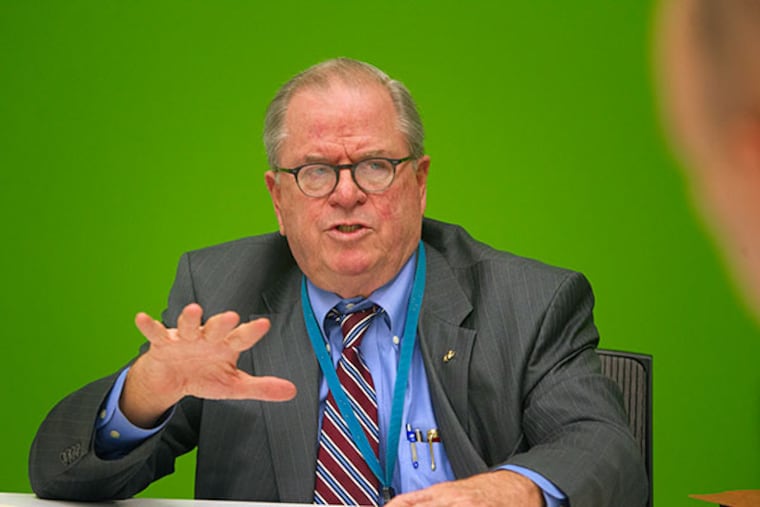If retained, Chief Justice Castille vows ethics push
Chief Justice Ronald D. Castille of the Pennsylvania Supreme Court said Wednesday that if reelected next week, he would push to ban judges from hiring relatives or hearing cases brought by lawyers who have made substantial contributions to their campaigns.

Chief Justice Ronald D. Castille of the Pennsylvania Supreme Court said Wednesday that if reelected next week, he would push to ban judges from hiring relatives or hearing cases brought by lawyers who have made substantial contributions to their campaigns.
In a meeting with the Inquirer Editorial Board, Castille said an overhaul of the state's Code of Judicial Conduct was among his main goals should he win retention.
Castille, a Republican, has been on the court for nearly three decades and its chief since 2008. He's on the ballot for a 10-year term, but will have to step down at the end of 2014 because next year he will turn 70, the mandatory retirement age for judges.
He said that he would seek to accomplish much in 2014, including overseeing the opening of a new $165 million Family Court building in Philadelphia and transforming how city courts set bail for those awaiting trial.
As he has done previously, Castille sharply criticized a fellow justice, Seamus P. McCaffery, a Democrat who is under FBI investigation in connection with referral fees paid to his wife, who is also his chief judicial aide.
While he stopped short of calling for McCaffery to resign, Castille said, "If I was in that situation, I would be concentrating on my defense."
McCaffery's lawyer, William J. Winning, of the Cozen O'Connor firm in Philadelphia, said later that Castille was out of line to criticize another member of the court so publicly.
"The chief justice has been and continues to be factually and legally wrong with respect to the matters involving Justice McCaffery," Winning said.
"And the most important fact here of all is that Justice McCaffery has done nothing wrong and has not violated any law."
The state's rules for judges were last overhauled 22 years ago. Those judicial canons are not criminal statutes, but judges have been suspended and even removed for violating them.
Castille predicted that one major change would bring the state into line with policies laid down by the U.S. Supreme Court in a key 2009 split decision. In that opinion, the high court ordered the chief justice of West Virginia to recuse himself from a $50 million case against a coal company whose chief executive had spent $3 million to help elect him.
This year, two advisory panels in Pennsylvania - one of the state Bar Association and the other a group named by the state Supreme Court - issued reports recommending that the state update its judicial rules.
The Bar Association urged a rule to require judges to disqualify themselves in a case if a litigant or lawyer has given them more than $2,500 in campaign donations in the previous two years.
Abraham C. Reich, the cochair of its panel, said such a rule would lay down a clear standard.
However, Superior Court Judge Anne Lazarus, who headed the other advisory panel, said in an interview Wednesday that a firm figure might not be appropriate for all counties. In some cases, a $2,500 donation could turn an election, but, in others, it would be a relatively small donation, she said.
In the interview with the editorial board, Castille endorsed the Lazarus approach.
Castille also said he would back an explicit a ban on nepotism in hires. Such a restriction was supported by the Bar Association panel, but not the Lazarus panel.
Castille said he was unsure whether such a ban should be retroactive. In any event, he said, it would not apply to his wife, Susan, a nonlawyer who is his top judicial aide.
"There is no nepotism on my staff," he said. "I didn't hire her."
Castille said his wife was already working for the court system before they met.
His support for a ban on the hiring of family comes at a time when Castille has raised vigorous objections to the referral fees collected by McCaffery's wife while serving as his court aide.
Castille contends it was improper for Lise Rapaport, McCaffery's wife, to accept the referrals while employed by the court. On Wednesday, he said McCaffery may have violated state and federal laws in connection with the referrals.
While Castille said his dispute with McCaffery has not disrupted his court's ability to function, he left little doubt that his enmity is deeply personal.
Castille, a former Philadelphia district attorney, lost his right leg in Vietnam as a Marine.
In the interview with The Inquirer, he cited that war injury when mentioning his anger upon learning last year that McCaffery had put a quote from Ernest Hemingway as a tag line on his court e-mails. The quote read, in part: "There is no hunting like the hunting of a man."
"I have hunted my fellow man," Castille said. "And my fellow man has hunted me, which is why I am in what the military calls a 'Mark II body configuration.' I found it highly offensive."
215-854-4821